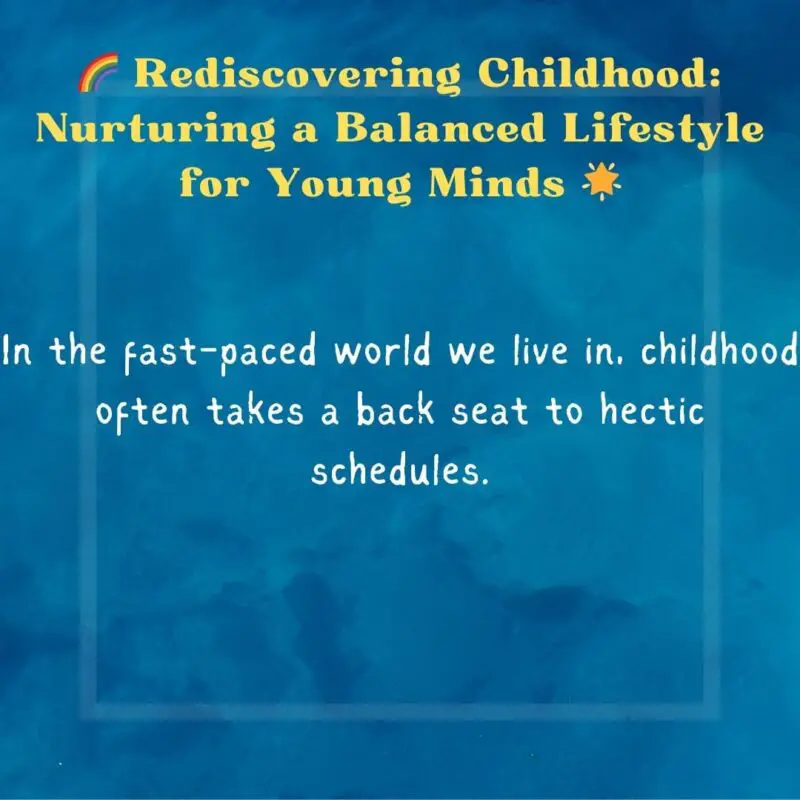-Rediscovering Childhood
Lifestyle for young minds In the fast-paced world of today, where schedules are tight and demands are high, the innocence and joy of childhood often take a back seat. With schools starting as early as 7 AM and children returning home only to plunge into a whirlwind of activities, it’s crucial to reevaluate the balance between academic pursuits and the essential need for unstructured playtime. In this blog, we explore potential solutions and suggestions to help restore a healthier and more fulfilling childhood experience.

The Overwhelming Routine of a lifestyle for young minds:
The typical school day for many children begins at 6 AM and concludes at 3 PM, leaving them with minimal time for personal rejuvenation and relaxation. After a brief window for essential activities, they dive into a cycle of homework, extra studies, and other commitments, leaving little room for unstructured play or exploration.
Suggestions for Improvement of a lifestyle for young minds:
- Reassess School Timings: Consider reassessing school timings to allow for a more balanced day. Research suggests that adolescents benefit from later start times, enhancing their overall well-being and academic performance. Collaborate with educators, parents, and policymakers to explore options that align with the developmental needs of children.
- Promote Holistic Education: Encourage schools to adopt holistic education models that recognize the importance of play, creativity, and social interactions. Integrating arts, sports, and extracurricular activities into the curriculum fosters a well-rounded development that goes beyond academic achievements.
- Advocate for Limited Homework: Excessive homework can contribute to stress and rob children of precious playtime. Advocate for reasonable homework policies that promote learning without sacrificing the essential elements of childhood. Quality, not quantity, should be the focus.
- Community Engagement: Foster community engagement to create opportunities for children to socialize and play. Local governments and communities can invest in public spaces, parks, and recreational facilities, providing safe environments for children to explore and play freely.
- Encourage Family Time: Recognize the importance of family time in a child’s development. Ensure that children have dedicated periods for quality time with family members, fostering strong bonds and creating a supportive environment for growth.
- Supportive Technology Use: While technology is a part of modern life, monitor and regulate screen time to ensure it doesn’t replace crucial activities like outdoor play. Encourage the use of technology for educational and creative purposes, balancing it with real-world experiences.
Fostering a Balanced “Lifestyle for Young Minds”
It’s imperative to recognize that childhood is a critical phase for cognitive, emotional, and social development. By reassessing and reshaping the current system, we can create an environment that prioritizes the well-being of our little ones. For further insights on creating time for outdoor play and enhancing the childhood experience, you can explore this article. Together, as parents, educators, and communities, we can ensure that the future generation not only excels academically but also enjoys a childhood filled with joy, exploration, and the simple pleasures of life. Let us work towards a balanced and harmonious approach that nurtures the holistic development of our children.
Do Follow for More Tips and Inspiration:
- Instagram: Follow us on Instagram
- Pinterest: Follow our Pinterest profile
FAQs related with “lifestyle for young minds”
- Why is it important to reevaluate the balance between academic pursuits and unstructured playtime for children? It’s crucial because a lack of unstructured playtime can hinder children’s cognitive, emotional, and social development.
- What are some suggestions for improving the overwhelming routine faced by young minds? Suggestions include reassessing school timings, promoting holistic education, advocating for limited homework, fostering community engagement, encouraging family time, and regulating technology use.
- How can reassessing school timings benefit children’s well-being and academic performance? Research suggests that later start times can enhance adolescents’ overall well-being and academic performance by aligning with their developmental needs.
- What is holistic education, and why is it important? Holistic education recognizes the significance of play, creativity, and social interactions in a child’s development, going beyond academic achievements to foster well-rounded growth.
- How can communities contribute to creating environments conducive to children’s play and exploration? Communities can invest in public spaces, parks, and recreational facilities to provide safe environments for children to socialize and play freely.
- Why is family time important for children’s development? Family time fosters strong bonds and creates a supportive environment for children’s growth, contributing to their cognitive, emotional, and social well-being.
- How can technology use be balanced to ensure it complements rather than replaces crucial activities like outdoor play? Technology use should be monitored and regulated to ensure it doesn’t replace outdoor play. It should be encouraged for educational and creative purposes while balancing it with real-world experiences.
